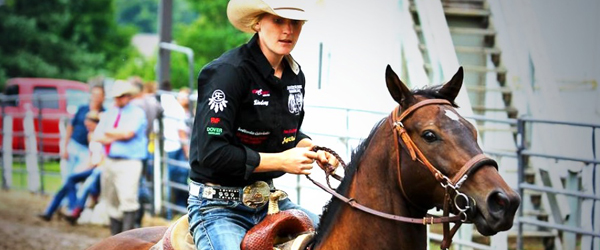 So you think former racehorses are tied even in retirement to the track, forever awaiting the call of the starting gate, pinning their ears at the sound of the bugle, their nervous systems overcome by adrenaline and their instincts in command of their wills?
So you think former racehorses are tied even in retirement to the track, forever awaiting the call of the starting gate, pinning their ears at the sound of the bugle, their nervous systems overcome by adrenaline and their instincts in command of their wills?
Once a racehorse always a racehorse? Can’t teach an old thoroughbred new tricks?
Don’t tell that to Lindsay Jensen and her seven-year-old mare Porsha, or to any of the other 11 horses and riders they competed against in something called the Extreme Retired Racehorse Makeover competition in Negley, Ohio, the first week of August.
With a mere 100 days of “re-training” to accomplish the task, Lindsay had Porsha reschooled well enough to take second place overall in the competition, using a free-style performance that had the crowd on its feet and hooting in appreciation.
Porsha was known as Doc of the Bay when she competed on the racetrack, a 2006 foal bred in Louisiana by Valene Farms of Minnesota. She finished that first career with a 3-9-6 record from 36 career starts and earnings of $84,000.
From the moment she started working with the small thoroughbred – Porsha’s only about 14.2 hands – Lindsay figured she had a good mare, one that would listen and learn.
For the most part that impression was correct, although at one point during training Lindsay said that an eye-to-eye heart-to-heart became necessary.
She left Rush Meadow Farm near Delano for the event not quite sure what to expect when they arrived as a matter of fact. “We were having a lot of issues about a month before the competition and that delayed training,” she said. “I couldn’t get anything done with her. She didn’t want to work.”
Imagine that, a horse led to water that won’t drink.
Then, with only days to go before the competition, something clicked, the sun shone through and Porsha started behaving like a student who knew her stuff. “A light just seemed to go on,” Lindsay said. “Really wonderful.”
Porsha was once again the sweetheart she had been originally. Working with her was once again a joy.
“I don’t know what set her off,” Lindsay questioned. “We’d be doing reigning-horse spins and she wouldn’t stop. I took her to the vet to see if something was wrong, just to make sure. She was sound.”
Armed with new information and a more profound understanding of the issue, Lindsay had a reaction most people might understand.
“Then I was mad,” she said.”We had a pretty big fight. I took her for a couple-of-hours ride and that made her mind right. She’s been perfect ever since.”
Nonetheless, Lindsay dropped the spin from her routine. She had enough to worry about without adding that to the list. She figured the spin must have set off a “brain trigger” of some kind. Doubts lingered in her mind. Would all go right in the arena, in front of a crowd, when every little thing mattered?
“She was the best she could have been, and I rode the best that I could,” she said.
The competition included a water jump and circle work around “those big construction cones. I did a couple of flying lead changes with her, too,” Lindsay continued. “Actually, at the end, while on her, I picked up the cones and carried them off. She did really well.”
The routines also required a freestyle demonstration and a basic pattern used in barrel racing.
“I had schooled her a lot on the barrels and it paid off,” Lindsay said. We had a little bobble but still managed to finish second.”
Porsha had been playing “demolition derby” with the second barrel during training, so Lindsay tried taking her a little wider on the turn. “She listened too much and took a huge wide step,” she said.”But she was really good anyway.”
Then came the part that thrilled the crowd, the most original freestyle exhibition of the competition. Armed with a 22-pistol loaded with blanks, Lindsay stood in the saddle and began firing off round after round, six in all, and Porsha stood there with her.
“Everyone was cheering,” Lindsay said, “and my legs were shaking when I was standing there, thinking that this might be the dumbest thing I’ve done all year.”
Just dumb enough to finish second in the nation, with a horse that once raced at Canterbury. Definitive proof that some horses can learn new tricks, after all.
This blog was written by Canterbury Staff Writer Jim Wells. Wells was a longtime sportswriter at the Pioneer Press and is a member of the Canterbury Park Hall of Fame.